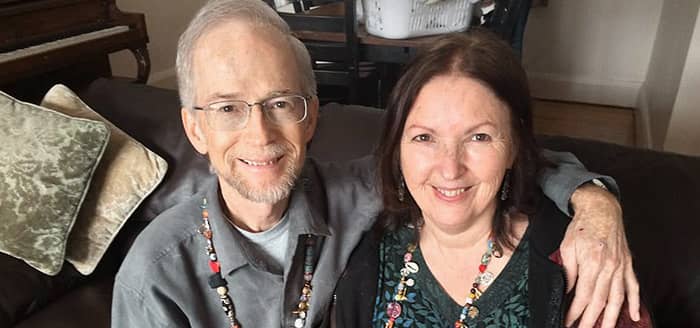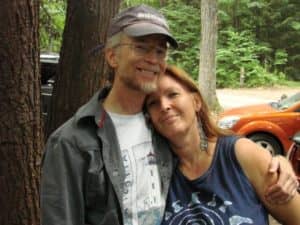Peritoneal Mesothelioma Survivor David Curtis Looks for Best Possible Outcome


Sometimes, you just get lucky. That’s not something that many people diagnosed with cancer think, especially not when the cancer they have is a rare form in an even rarer location!
“It was a huge stroke of luck that Dr. Barnabi found the tumor,” David wrote in a lengthy post on Facebook describing the discovery and treatment of his diagnosis in October 2015. He had gone in to have surgery on a hernia, only to have his doctor discover a lump. As it turns out, that lump was an early-stage peritoneal mesothelioma tumor, and the doctor had literally found it by accident. “He said it did not look like anything to worry about, just a bit of fatty tissue, but he sent it away for a biopsy anyway,” David remembered. “That decision saved my life.”
The Mesothelioma + Asbestos Awareness Center reached out to David to learn more about his story. About seven months before he was diagnosed with cancer, David began a new job working as legal counsel for Children’s Aid, an organization that advocacy, adoption, and foster care services for children, in a small town in Ontario. Before that, he had worked in family law and as a forester.
None of his experience, however, prepared him for the shock of being diagnosed with peritoneal mesothelioma. Prior to that, he had only heard of pleural mesothelioma, which affects the lungs, and that only vaguely. “I had never heard of peritoneal mesothelioma,” David told MAA Center. “I had no involvement at all with mesothelioma cases as a lawyer. The doctor had to explain what it was.”
Dealing with a Mesothelioma Diagnosis
As is often the case when being diagnosed with cancer, David was initially surprised and dismayed by the news. “I was obviously not happy about it, and a little bit in shock I suppose. My first thought was, ‘Okay, what do I need to do to fix this?’”
Nonetheless, David remained positive, in part because he had no idea how rare and deadly of a cancer peritoneal mesothelioma is. “I have to say, I had no doubt from the outset that I would get through this somehow. But I’m sure my doctor was thinking he had just given me a death sentence.”
In his Facebook post, David explained that the decision to remain ignorant about the realities of the disease was a calculated one, made in collaboration with his wife, Krow.
I decided not to inform myself of the odds of survival, the statistics, and the fine details of the disease and surgical procedures available. Krow agreed to do the research and learn about what we were facing. We decided together that it was better for me to keep in a calm and hopeful place as we navigated through this new world we found ourselves in. We believed the less stress and fear I was experiencing, the better chances I had of making it through.
David elaborated on his experience in his response to MAA Center, saying his family responded “with shock, sadness, and unconditional love and support.”
“My wife Krow in particular made the difference by learning all about it and very quickly finding the team in Toronto that could help me,” David continued. “Not to mention taking almost six months off her self-employment to care for me 24/7.”
Tracing the Disease Back to Asbestos
Although David was unable to pinpoint the exact exposure to asbestos that caused his mesothelioma, he recalled childhood experiences that may have been where it all began. “I recall we had a piece of asbestos ore in our house as kids,” David told MAA Center, “and we would regularly play with it, peeling fibres off of it.”
In his Facebook post, David described another experience that may have contributed to his exposure:
I also remember visiting Thetford Mines as a kid on a school trip. This was before the dangers of asbestos were common knowledge. We would all play with the rock, peeling the fibres off of it. My youngest brother admitted to licking it, as only young kids would do!
At the age of 14, David developed acute appendicitis, and his appendix burst before he could have it removed. He believes that asbestos may have been the cause of the appendicitis, and that when his appendix burst, it likely spread asbestos fibers into other parts of his abdomen, where they slowly inflamed his organs over the next several decades.
However, David recalled other times in his life where he was exposed as well. In his responses to MAA Center, David said, “I know I was exposed to many other sources including tiles, insulation and various products over the years, but I can’t pinpoint any one incident or occupation that might be more definitive.”
Mesothelioma Surgery and Recovery

David Curtis and his wife, Krow Fischer
To treat his mesothelioma, David decided to try a radical surgery that is performed in only a handful of cancer clinics around the world. However, he had to wait three months before he could have the surgery. In the meantime, David said he tried as much as possible to approach his day-to-day life the same way as he had before his diagnosis.
“I did start on some alternative therapies,” David told MAA Center, “such as herbal remedies (astragalus, red clover, etc.), and they did seem to help a bit. I had three months between the diagnosis and the surgery, and for the most part kept it pretty normal.”
The surgery itself was complex and took about 15 hours. It involved removing the peritoneum, omentum (a layer of fatty tissue near the stomach), and David’s abdominal organs, then performing a hot chemotherapy “wash” of the abdominal cavity. The peritoneum, omentum, spleen, and gall bladder had to be removed permanently, as well as part of the small intestine, the entire ascending colon, the sigmoid colon and part of the rectum. Other organs – including his bladder, diaphragm, liver, and pancreas – had tumors removed from them, and then were replaced after the chemo wash.
Near the end of the surgery, the surgeons had some concerns about David’s stability, but in the end the drastic procedure was successful. Worries about the functioning of his digestive system after the surgery were alleviated. “Thanks to Dr. Bischof’s thoroughness and competence,” David wrote on Facebook, “she was able to leave me with full functionality in terms of my digestive system.” At least 97% of the cancer was removed surgically, and his doctor told David that she believed the chemo wash had taken care of the rest.
Even with the successful surgery, David had a long way to go. He spent four days in the ICU where, in addition to the care provided by the hospital staff, he was tended by his wife Krow and a friend who provided healing energy. Krow brought homemade bone broth that David believes was a significant boost in his recovery. “Bone broth is rich in minerals that support the immune system and contains healing compounds like collagen, glutamine, glycine, and proline,” David explained in his post. “The collagen in bone broth will heal your gut lining and reduce intestinal inflammation. It is a highly beneficial ‘first food after gut surgery.’”
In total, David spent 12 days in the hospital, but his recovery didn’t end there. Given the trauma to his gastrointestinal tract, he was beset with uncontrollable diarrhea and his strength took time to return. Nonetheless, due to the ministrations of his wife Krow, who continued making healthy meals and tending to his other needs, David was able to recover more quickly than even he anticipated. Two things David found particularly helpful were taking probiotics and drinking rice water made by Krow.
Homemade Rice Water
5 cups water
1 cup basmati rice
Step 1: Bring water a boil and add rice. Boil for 45 minutes.
Step 2: Drain water through a sieve.
Drink about 1/4 – 1/2 cup of rice water with each meal.
Within two months of surgery, David was back to work part time and resumed full-time work a month later.
Learning to Rely on Others
David told MAA Center that one of the most difficult aspects of his diagnosis, treatment, and recovery has been learning to accept help from others. In fact, at first he didn’t even want to tell anyone outside of his immediate circle. That impulse, he acknowledges now, was wrong.
Initially I wanted to keep it completely private but then agreed to let friends and family in. I told my immediate supervisor at work, but otherwise told no one there about it until just before the surgery. I didn’t want people to treat me any differently or view me with sympathy. I needn’t have worried; I was completely supported by my employer and colleagues. My overall feeling now is one of deep, deep gratitude. Not only have I survived, but in many ways am better for it. It has strengthened bonds with friends and family, and I see the world through survivor’s eyes and with great appreciation for being alive and able to continue to contribute.
Not only have emotional and relationship bonds been strengthened, but David believes the support he received from his family, friends, and co-workers had a direct impact on his survival. “The most important lesson I’ve learned from all this is to let people in and accept the support offered, not an easy thing for me to do. And people really want an opportunity to help somehow. No one should go through this alone and having lots of support can make the difference for survival, as it did with me.”
The generous spirit David found in others is something he exhibits as well. His goal was never to simply survive, but to also be able to return to doing something he loves. “It felt very important to me to get back to work as soon as possible, because I hadn’t been there that long when I got my diagnosis,” David told MAA Center. “I really enjoy the work, and did not want to leave them short-handed for too long. Plus I’m not one to sit around. If the work was more physically demanding, I would have had to stay off longer. The thing I love most about what I do is that it helps kids in need.”
Calling for Asbestos Accountability
David’s exposure to asbestos as a kid was innocent, and other exposures occurred at a time when asbestos was ubiquitous in Canada. Since then, Canada has come close to passing a complete ban – something the United States and a number of other countries still have yet to do. David believes this situation is unacceptable.
“All those impacted by asbestos have to keep up the pressure for a complete ban,” David told MAA Center. “This is a substance that should never have been dug out of the earth.”
When it comes to implementing and enforcing a ban, David isn’t sure why it has taken so long. “It’s hard to understand why governments are so slow to act on this. Maybe if they were held legally liable for all the harm caused, that might get their attention.”
More importantly, though, David wants everyone to know about the dangers of asbestos. “The thing that really galls me is that though the impact of asbestos is not commonly understood by the public, in my opinion the knowledge that it causes cancer has been around for centuries, and there are those in governments and industries that certainly have had the knowledge for many decades. So they knew, and still did nothing about it.”
With the help of mesothelioma survivors like David, and the ones who are close to them, hopefully, we can change that situation.